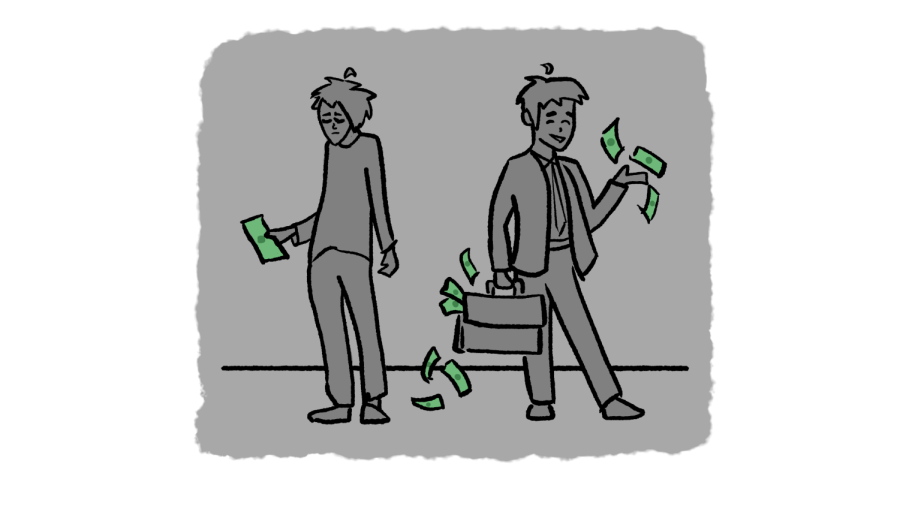Maximizing the Minimum Wage
Poor man, rich man.
February 16, 2023
Over 40 million people in the US live in poverty. The federal minimum wage, currently set at $7.25 per hour, has not been increased since 2009 even as the cost of living has risen significantly. The stagnancy of minimum wage has led to over a million low-wage workers struggling to make ends meet and support their families. Although some have qualms about the economic impact, increasing the federal minimum wage is not only morally just, but it would also have a positive impact on the economy and society as a whole.
Increasing the minimum wage would help to reduce poverty and income inequality. The current federal minimum wage is not enough to lift a full-time worker (defined as 30 hours per week) out of poverty. According to the Economic Policy Institute, a single adult with no children would need to earn at least $15.50 per hour to afford a basic standard of living. For a single parent with one child, the hourly wage needed is even higher at $20.40. This means that many low-wage workers are living in poverty despite working full-time. This issue can be solved if the federal minimum wage is increased, allowing workers to properly provide for themselves and their families. Low-wage workers would see an increase in their incomes, while high-wage workers would see little or no impact. This would help to narrow the gap between the richest and poorest in society.
Increasing the minimum wage would also boost consumer spending, stimulate economic growth, and increase worker productivity. When low-wage workers receive a pay increase, they are more likely to spend it than higher-wage workers, as they are more likely to have been living paycheck to paycheck. This increased consumer spending would help to stimulate economic growth and create jobs.
In addition, when low-wage workers are paid more, they are less likely to rely on government assistance programs such as food stamps and Medicaid. Reducing government spending on these services will free up funds for other priorities. An increase in the minimum wage would also help to improve worker productivity and reduce turnover. Low-wage workers who are paid a living wage are more likely to be motivated, engaged, and committed to their work which will not only increase quality of work but also overall satisfaction in jobs. Due to an decrease in worker turnover, employers could reduce recruitment and training costs, which would benefit both the employer and the employee.
One of the main arguments against increasing the minimum wage is that it would lead to job loss, especially for small businesses. However, there is little evidence to support this claim: a number of studies by Belman and Wolfson (2019), Clemens (2019), Neumark (2019), and others have shown that increases in the minimum wage have had little or no impact on employment levels. Furthermore, many small businesses already pay their employees above the minimum wage in order to attract and retain labor workers. In fact, in many places with higher minimum wage, businesses are still able to thrive while the employers are able to keep their employees more satisfied and motivated.
Finally, increasing the minimum wage is also a moral imperative. Everyone who works full-time should be able to afford a basic standard of living. In a society as financially stable as the United States, it is unacceptable for anyone to live in poverty, especially when they are working full-time. About 13% of people in the US live in poverty, a relatively high number for a country as prosperous as America. By increasing the minimum wage, the country as a whole can significantly decrease the poverty rate, which will improve the overall quality of life of Americans. The time has come for the federal minimum wage to be increased to a level that allows all full-time workers to afford a basic standard of living.








































